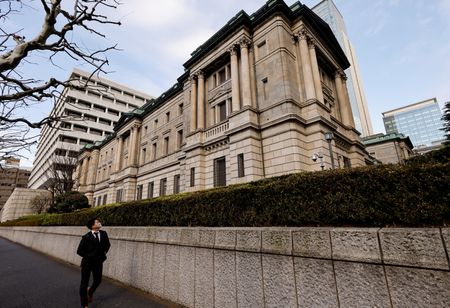
By Junko Fujita and Tom Westbrook
TOKYO (Reuters) – Investors have dialled down wagers on a policy shift at the Bank of Japan this week, which has opened a window of calm that ironically affords governor Kazuo Ueda a chance to move quickly.
For months investors have been doubting policymakers’ assurances that the BOJ isn’t planning to change its ultra-easy settings yet, with speculation hitting fever pitch in January after a sudden adjustment to BOJ yield targets late last year.
Ueda has given no clues a fresh move is imminent and accordingly pockets of dislocation in the bond market, where short-selling has focused, are easing, and traders are pushing back expectations for policy tweaks to June or July.
The gap between market-set 10-year interest rate swaps and 10-year government bond yields, which the BOJ caps, is at its narrowest in eight months and almost 40 basis points tighter than when it was at its widest in 25 years in January.
Dealers say BOJ efforts to make short selling more expensive have also worked and that investors are simply avoiding the market, rather than crowding into bets on yields rising.
Implied dollar/yen volatility in the currency options market is well below January highs too, suggesting forex traders aren’t expecting wild moves either.
The calm could be opportune for the BOJ.
“I’m thinking that the market is very under positioned (for a shift),” said James Malcolm, head of FX strategy at UBS in London, where the house view is for the BOJ to move in June or July, but he sees a risk policymakers take their chance to act.
“By process of elimination they have to adjust yield curve control before June-July (market) consensus,” he said, which could be by widening or moving the 10-year yield target band that currently keeps yields within 50 bps of zero percent.
Others believe yield targets could be abandoned altogether.
Sources familiar with BOJ thinking say such changes may be delayed, and instead Ueda could adjust guidance on the outlook and drop references to COVID-19 shaping policy.
Nearly 90% of economists polled by Reuters said they expect no policy change. About 40% expect a change in June.
RETREAT
Inflation at 40-year highs and the biggest wage rises seen in decades are behind investors’ conviction that years of loose monetary policy must end soon for Japan.
And they have bet in defiance of BOJ rhetoric, a trade nicknamed the “widowmaker” for its propensity to fail. Wagers have centred around short selling the 10-year bonds that the central bank has kept artificially pricey by capping yields.
With the BOJ spending a staggering $1 trillion defending that cap in the year through to March, along with other measures to make shorting costlier, a lot of investors have given up.
Foreigners’ record weekly purchase of JGBs in the week after the March meeting was largely attributed to closing shorts.
The gap between futures’ implied yields and cash yields, which can blow out when futures are heavily shorted, has also narrowed.
“It seems many funds were forced to cover their short positions,” said Tomohiro Mikajiri, head of yen and non-yen fixed income trading in Japan for Barclays. “Hedge funds which attacked the BOJ’s policy have retreated from the game.”
A rally in global bond markets has also helped make Japan’s low yields look slightly less out-of-step with the rest of the world. Ten-year cash yields were last at 0.455%, below the 0.5% cap, and 10-year interest rate swaps were at 0.64%. [JP/]
Ueda’s most recent remarks have stressed the need to keep policy settings loose for now, without ruling out the possibility of future changes. On Sunday the Sankei newspaper reported the BOJ is considering a review of the impact of its policy settings, which could foreshadow changes.
Nomura strategist Naka Matsuzawa said the path ahead would be a balance between getting a policy change done, and improving communication. Others remain wary of surprise.
“I don’t think Ueda’s words will necessarily match his actions,” said Brent Donnelly, currency trader and president of analytics firm Spectra Markets, who also noted the market is under-positioned for a move this time around.
“Remember they changed policy in December 2022 right on the heels of similar dovish comments from (former governor Haruhiko) Kuroda. If their strategy is to trick the market, like they did in December, they could move at this meeting.”
(Reporting by Junko Fujita and Tom Westbrook; Editing by Jacqueline Wong)

